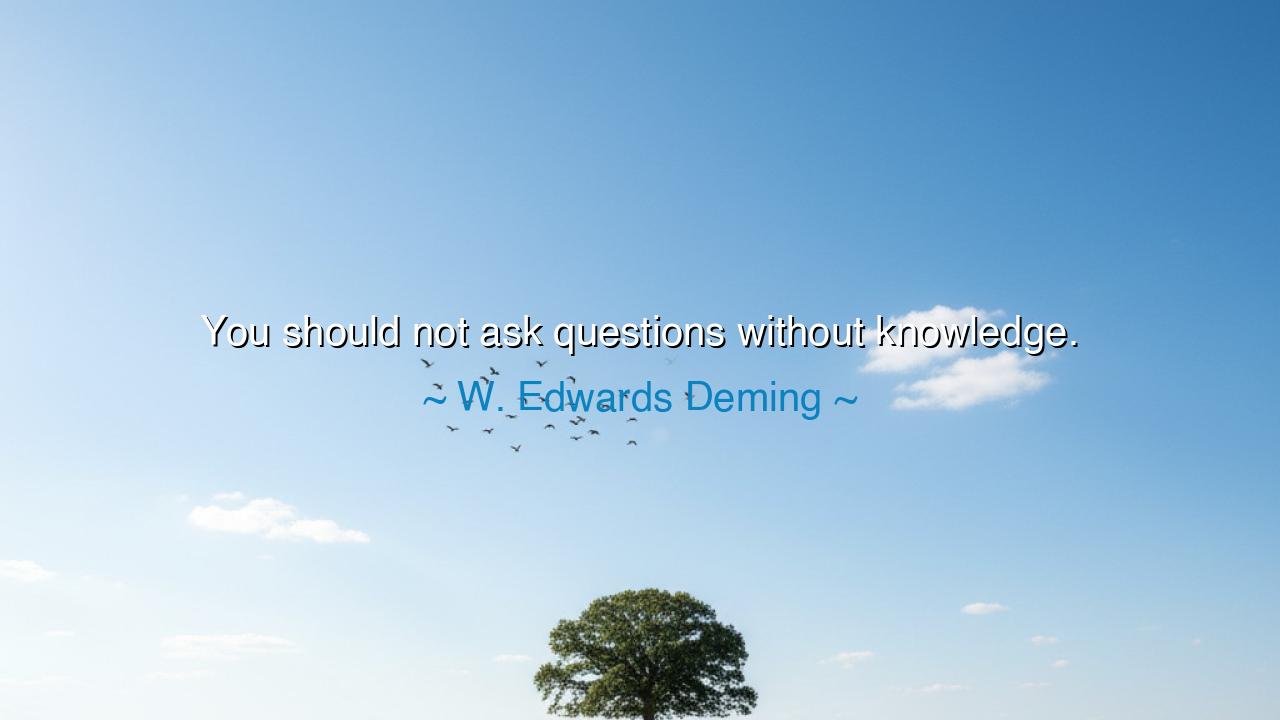
You should not ask questions without knowledge.






Hear, O seekers of wisdom, the stern and guiding words of W. Edwards Deming, master of systems and father of quality, who declared: “You should not ask questions without knowledge.” This is not a dismissal of curiosity, but a call to prepare the mind before it speaks. For Deming, who transformed industry with his teaching, knew that a question asked without foundation is not a torch of discovery, but a spark lost in the wind.
The origin of this utterance lies in Deming’s work among factories and nations. In postwar Japan, when industries lay in ruin, he taught leaders not only to measure but to understand, not only to inquire but to ground their inquiry in truth. He saw that many would leap to questions without first observing, studying, or grasping the facts. Such questions, he warned, lead not to progress but to confusion. But when knowledge precedes inquiry, then the question becomes sharp, focused, and powerful—an arrow that strikes the heart of the problem.
Consider, O listener, the tale of the physician Hippocrates, father of medicine. If a healer were to ask, “What ails this patient?” without first studying the signs, feeling the pulse, listening to the breath, his question would be vain and his treatment dangerous. But if he approached with knowledge—with training, with careful observation—then his questions became the pathway to healing. So too in every field of life: questions without preparation are folly; questions with foundation are wisdom.
Or recall the story of the great inventor Thomas Edison. In his laboratory, he did not blindly ask, “How can I make light?” He studied currents, filaments, resistances; he failed a thousand times but with each failure gained knowledge. When he finally framed his question with precision—“What material will burn long, bright, and steady?”—he discovered the path to the incandescent lamp. His greatness lay not in idle speculation, but in questions honed by relentless study.
Thus Deming’s words bear a deeper truth: to ask is noble, but to ask well is divine. A foolish question may waste time and scatter the efforts of many; a wise question may open the gates of innovation, justice, and progress. To ask without knowledge is to wander in the dark without a lamp; to ask with knowledge is to strike a light that guides the way for all.
The lesson is clear: prepare yourself before you seek. Do not rush into inquiry out of laziness or vanity. First observe, read, listen, and reflect; then frame your questions with care. Let them be born of understanding, sharpened by discipline, and aimed at truth. For the world has no shortage of noise, but it cries out for questions that cut through the noise and reveal wisdom.
Practical action lies within reach. When faced with a problem, gather the facts before you ask. When speaking to teachers, leaders, or elders, honor their time by grounding your questions in effort and thought. When seeking truth in your own life, study yourself honestly, so that your questions are not excuses, but true calls for growth. In every conversation, in every pursuit, let knowledge prepare the soil before the seed of the question is planted.
So remember Deming’s teaching: do not ask questions without knowledge. For inquiry without preparation is folly, but inquiry with preparation is power. Walk this path, O seeker, and your words will not scatter like chaff in the wind, but will strike like arrows, piercing through uncertainty to the heart of truth.






AAdministratorAdministrator
Welcome, honored guests. Please leave a comment, we will respond soon